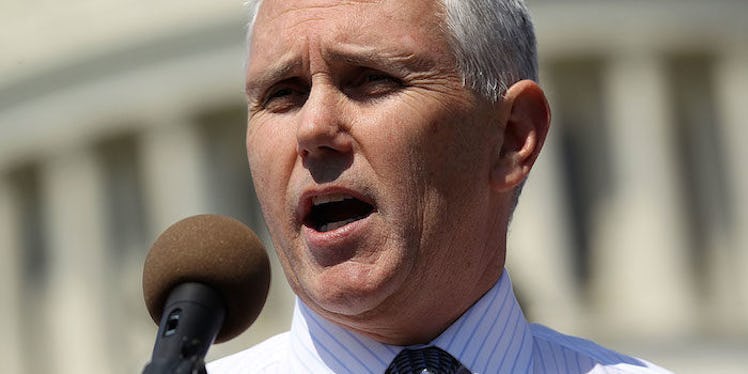President John Fitzgerald Kennedy once stated:
We are confronted primarily with a moral issue… whether all Americans are to be afforded equal rights and equal opportunities, whether we are going to treat our fellow Americans as we want to be treated.
This was back in 1963, the same year Martin Luther King Jr. gave his “I Have a Dream” speech, and in 2015, we're still debating over people's basic rights and freedoms.
It's baffling that we haven't come further as a society.
When President Kennedy made that statement, America was on the cusp of major changes regarding the civil rights of minorities.
Today, the rights of the LGBT community, among others, are under threat in Indiana due to the Religious Freedom Restoration Act (RFRA) law passed on March 26. Indiana Governor Mike Pence has vehemently defended Indiana's RFRA.
Yet, because of widespread national controversy and boycotts to the state over fears that the bill would encourage and lawfully back homosexual and gender identity discrimination, Pence signed a new measure into the law so that it no longer supersedes local ordinances banning discrimination.
In Pence's statement, made on April 2, regarding the passing of these new revisions, he told Hoosiers and the nation they simply don't need to worry anymore:
Hoosiers deserve to know, that even with this legislation, the Religious Freedom Restoration Act enhances protections for every church, non-profit religious organization or society, religious school, rabbi, priest, preacher, minister or pastor in the review of government action where their religious liberty is infringed. The law also enhances protection in religious liberty cases for groups of individuals and businesses in conscience decisions that do not involve provision of goods and services, employment and housing.
Thus, a part of what Pence is saying is people and organizations can legally defend discriminatory actions, as long as there aren't commercial, employment or housing factors involved.
This addition to the Indiana RFRA law solely defends its intentions and has nothing to say for the separate civil rights laws aimed at prohibiting discrimination in the workplace, in housing matters and in places serving the general public.
The Indiana law may “prohibit governmental entities from substantially burdening a person's exercise of religion, even if the burden results from a rule of general applicability.”
Indiana still lacks the necessary civil rights protections to prohibit such actions. In other words, it allows business owners to deny service to customers without religious grounds.
Legal experts noted the amendment does not change Indiana's status quo, whereas discrimination against gays and lesbians is not entirely prohibited due to the lack of statewide civil rights protections.
There are still 29 states where it is legal to deny service to gays and lesbians in a civil sense, meaning that it's OK to say, “I don't serve your kind around here.”
According to the Washington Post,
State law in Indiana does not prohibit discrimination on the basis of sexual orientation or gender identity. A person can be fired because he's gay or denied housing because she's transgender. A hotel can deny a room to a gay couple bearing the sign, 'Just Married.' So we hear, in a somewhat underwhelming response to criticism of the new Indiana RFRA law, that LGBT people haven't lost any legal protection because they never had it.
Explicit amendments to state civil rights laws are the first step toward ending public discrimination against LGBT groups.
The controversy in Indiana has, at least, opened up the nation's communication pathways regarding religious liberty and LGBT discrimination, but civil rights need to be addressed for a comprehensive negation of discrimination.
Robert Katz, professor at Indiana University Robert H. McKinney School of Law, told USA Today:
This self-inflicted crisis will not end until the Indiana Civil Rights Act is amended to ban discrimination based on sexual orientation and gender identity.
The push for civil rights and discrimination protections against LBGT groups is a great first step toward equality, but the Indiana controversy regarding RFRA's still exposes a growing sentiment of the war on religion.
Back in 2011, the Center for American Progress (CAP) released a poll, showing that the majority of Americans support workplace nondiscrimination protections for gay and transgender people, and this support traversed party and religious affiliation (74 percent of Catholics and 61 percent of senior citizens were found to be in favor of employment protections for gay and transgender people).
The pendulum of “I support LGBT rights, but I don't support the government forcing me to support LGBT rights” seems to be apparent when the Indiana RFRA controversy and the CAP 2011 results are placed side-by-side.
So, what is it the larger picture here?
Are religions really being attacked by the government? Do we officially have a “War on Religion” in which liberal and loose laws are undermining majority traditional values and transforming our beautiful country into the sinful underbelly of Sodom and Gomorrah?
Or are we living in times when LGBT individuals are still socially sidelined, when religious freedom laws inadvertently draw the focus away from real advances in real civil rights laws explicitly prohibiting LGBT discrimination in all its forms?
The conversation regarding religious liberty and LGBT civil rights is still in its early stages, streamlined into the mainstream collective thanks to Pence and the nationwide controversy over the Indiana RFRA.
Although critics, such as Angie's List, state that these amendments are still insufficient and limited, the passing of this amendment does illuminate the first Indiana recognition that sexual orientation and gender identity are pressing matters of anti-discrimination concern.
Looking back on 1963, it was also similar controversies that led the country to full legal protection against discrimination for African Americans.
Citations: Indiana Gov. Mike Pence approves limited LGBT protections in religious freedom law (VOX)
